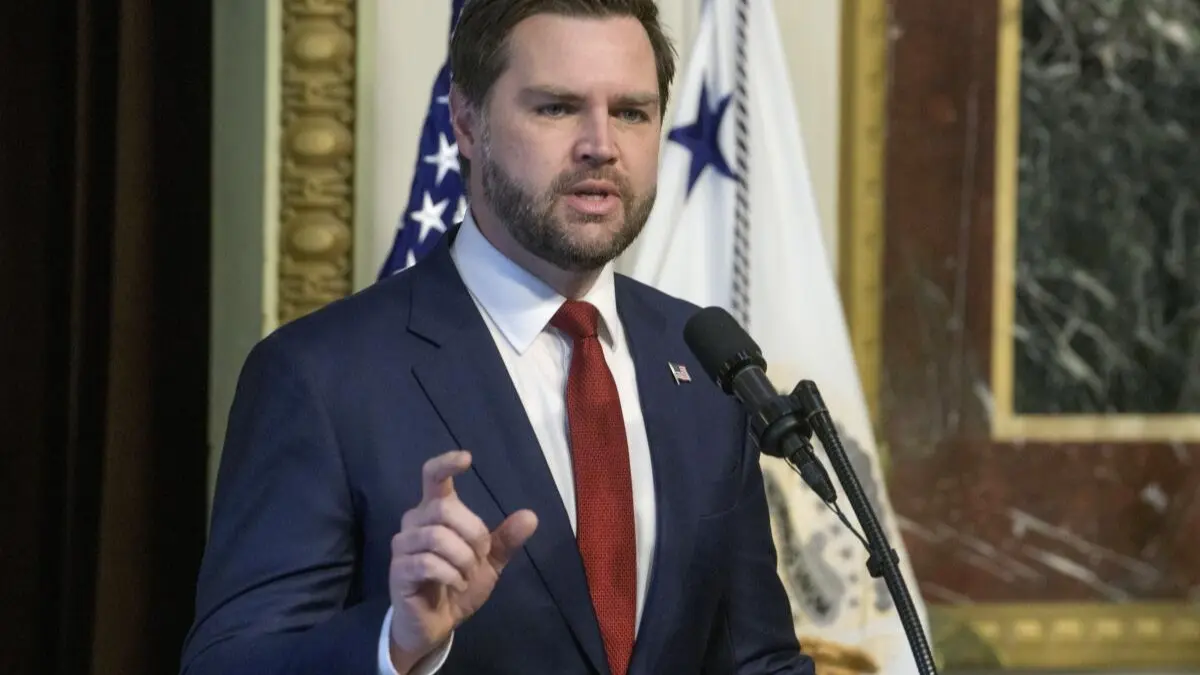Updated 15 April 2025 at 18:57 IST
US Vice President JD Vance’s Antitrust Push Against Big Tech Gains Momentum
Several of Vance’s former aides have landed in positions within the Trump administration that will be crucial in advancing antitrust policies.
- World News
- 4 min read

US Vice President JD Vance’s allies are poised to take on Big Tech in a major way under the Trump administration. As Vance pushes the administration to adopt more aggressive antitrust policies, particularly aimed at breaking up dominant tech companies, his allies in key positions are ready to enforce these changes.
Vance has long been an outspoken critic of Big Tech, especially its influence on American society. "We believe fundamentally that Big Tech does have too much power," Vance said in the first week of the new administration, as per a report from Axios. A former Ohio senator, Vance has previously called for breaking up Google and has expressed concerns over tech companies censoring conservative voices and exerting too much control over people's daily lives. This stance has struck a chord with President Trump's MAGA base, diverging from the traditional Republican approach.
Vance’s Allies in Key Antitrust Roles
Several of Vance’s former aides have landed in positions within the Trump administration that will be crucial in advancing antitrust policies. These individuals are now in charge of enforcing laws that could break up large tech companies and block potentially harmful mergers.
Gail Slater, Vance’s economic policy adviser in the Senate, was recently confirmed as Assistant Attorney General for the Justice Department's Antitrust Division.
Advertisement
James Braid, who worked with Vance when he was in the Senate, now leads the White House’s office of legislative affairs as antitrust bills are reintroduced in Congress.
James Lloyd, Vance's former deputy policy director, previously led the Antitrust Division in Texas, where he took legal action against tech giants like Google.
Advertisement
Jacob Reses, Vance’s chief of staff, was previously a senior policy adviser to Sen. Josh Hawley (R-Mo.), who has been a vocal advocate for antitrust measures against Big Tech.
These appointments signal a coordinated effort to tackle what Vance and his allies see as an out-of-control tech industry.
Here is what you need to know
Some have even referred to the Federal Trade Commission (FTC) as the "Trump-Vance FTC," a nod to the influence the Vice President’s views have on the agency’s direction. However, Democrats have raised concerns about the agency’s strength, particularly following President Trump’s removal of two Democratic commissioners. Critics argue that this could weaken the FTC’s ability to pursue antitrust cases and make the agency more susceptible to Trump’s influence.
A Shift in Republican Antitrust Sentiment
Vance’s push to regulate Big Tech reflects a broader shift in Republican thinking. Traditionally, Republicans have championed free market policies. But now, a small but growing group within the party, including Vance, believes that some companies have become too powerful and need to be reined in. Vance himself has previously praised Lina Khan, President Biden’s FTC chair, known for her aggressive stance on antitrust issues.
However, not all Republicans agree with Vance’s approach. High-profile figures like Elon Musk and Rep. Jim Jordan (R-Ohio) have criticized antitrust moves against tech companies, and business-friendly groups, including the Chamber of Commerce, have worked to rally opposition to Khan's policies.
Differences Between Trump and Biden's Antitrust Approaches
While both the Trump and Biden administrations have been active in antitrust enforcement, the motivations behind their policies differ. Under Biden, the focus has been on consumer protections, increasing choices, and improving online experiences. In contrast, Trump’s administration, led by figures like Vance, is more focused on large tech companies’ control over speech and their perceived bias against conservative voices.
Tech's Complicated Relationship with Vance
Despite Vance’s aggressive stance on breaking up Big Tech, he is not completely hostile to the industry. Early in his political career, he received backing from tech figures like Peter Thiel. Additionally, Vance shares concerns with some tech companies over the European Union’s aggressive policies toward artificial intelligence and content moderation. However, the approach of balancing innovation with antitrust action has left some in the tech world questioning how to navigate Vance’s vision for the future of Big Tech in the U.S.
A recent antitrust conference in Washington illustrated the deep divides and growing interest in tech regulation. Speakers from across the political spectrum, including Steve Bannon, have warned that the Justice Department and FTC are now more focused on aggressive antitrust actions against Big Tech than ever before. Bannon remarked, "Look at our Justice Department. Look at some of the commissioners we're putting on there... These people are almost as big of fire breathers as me and Lina Khan."
As Vance’s allies gain influence in the Trump administration, Big Tech’s days of unchecked power may be numbered. With the Vice President and his team leading the charge, it seems likely that antitrust policy will be a central focus in the coming years, marking a significant shift in Republican policy on corporate power and the role of technology in American life.
Published By : Sagar Kar
Published On: 15 April 2025 at 18:57 IST
